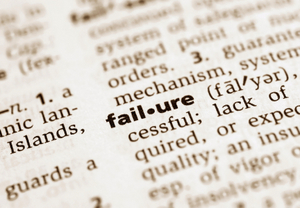
Ideological presumptions should not obscure key elements of “government failure.”
Politicians and commentators often depict government failure as some sort of modern epidemic burdening society. But equally often the concept of “government failure” remains inadequately defined.
As a term of art, the phrase “government failure” is relatively new. It emerged in the 1960s with the rise of intellectual and political criticism of regulation. Building on the premise that the only legitimate rationale for government regulation is market failure, economists advanced new theories explaining why government interventions in markets could be ineffective or inefficient. This line of literature supposedly established the theoretical foundation of the phrase “government failure.”
But the phrase “government failure,” as commonly used, is unrelated to any meaningful standards that separate success and failure. The use of the term and its relatives (e.g., “government breakdown” and “regulatory failure”) mostly reflects ideological positions. When people use the phrase “government failure,” they ordinarily have in mind a particular view about the desirable role of government in society. Their conclusions about government failure are tied to their ideological views of that role. For example, the phrase “government failure” ordinarily implies that less government action is necessarily better. Or, as President Reagan declared in his first Inaugural Address: “government is the problem.”
Is it true? Is government doomed to fail?
If we want to seriously discuss government failures, there should at least be general standards to distinguish between “failure” and “non-failure.” Three core concepts are central to understanding and defining that standard.
First, imperfection is not the same as failure. “Perfection” is never cost-effective or practical to demand any way. Nevertheless, too often both critics and advocates of regulation equate imperfections with failure. Some critics argue that any government intervention in markets burdens market participants, particularly in the case of imperfect markets. Therefore, they argue, free markets are the desirable prescription for society. But this prescription has consistently failed. Imperfect government regulation still may be better than no regulation at all.
Unlike critics of regulation, advocates of regulation expect the government to act. Some expect the government to address any problem they consider important, and tend to believe that imperfect responsiveness amounts to a failure. But not all problems can or should be addressed by the government. Furthermore, when the government does address problems, it may not be efficient or otherwise worthwhile to eliminate them completely.
Second, government inaction, as much as action, may result in failure. Very often, the distinction between “action” and “inaction” is artificial. But present law offers several presumptions against challenging government inaction. Several legal doctrines—standing, the interpretation of legislative inaction, and the reviewability presumption—serve as tools for dismissing critiques of inaction. Again, debates over the distinction between government action and inaction are a byproduct of views regarding the role of the government in society. On one side, people see overregulation. On the opposite side, people observe insufficient regulatory safeguards. These opposing perspectives delineate the approaches to government inaction. Some posit that inaction cannot be scrutinized, let alone considered a failure, while others maintain that similar rules should apply to government action and inaction.
But any firm distinction between government action and inaction in defining government failure is analytically flawed. Government inaction means, among other things, accommodation of externalities. The underlying logic of exempting government inaction from scrutiny is that government actions can violate rights, but government inaction cannot. Under this premise, for example, environmental regulation violates polluters’ rights, while government inaction on environmental issues does not violate the rights of those affected by pollution. Similarly, gun control measures abridge Second Amendment rights, but government inaction over gun control does not abridge victims’ rights. Or, restrictions on tobacco sales infringe rights of businesses, whereas inaction on tobacco does not infringe the general public’s rights. These premises are problematic because they regard some rights as absolute, and indeed accommodate externalities.
Third, evaluations of government failure incorporate a variety of standards. It is often tempting to suggest that efficiency or cost-benefit analysis alone ought to provide the benchmark for governmental success or failure, but such a view is unrealistic. Other normative standards—that may be established in principles of “equity” and “justice” or simply appear “fair” although they violate cost-benefit analysis—have always influenced perceptions of government failures, and will always do so. These other standards become particularly salient in social issues, such as abortion, gun control, and civil rights, but they may help justify governmental action that at times seems to be inefficient.
In sum, governmental policies and their implementation are designed by humans to address a complex reality. Although no one should expect that government will always succeed, reliably determining when government has actually failed first requires greater clarity about the criteria that separates government failures from non-failures. We should acknowledge that perfection is an impractical criterion, that government can fail through inaction as well as action, and that efficiency and other normative standards can be valid measures of government performance.




